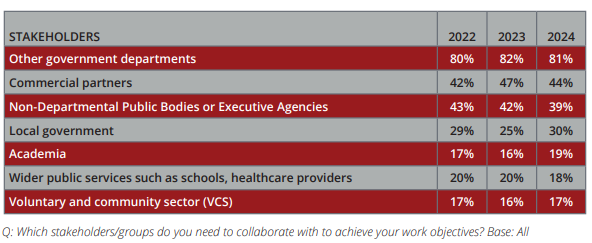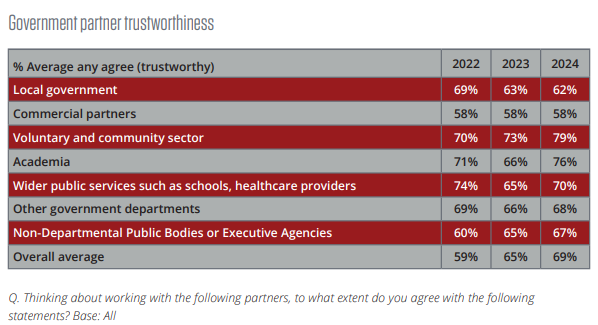Less than one in five civil servants say their work is now mission-focused, according to a survey carried out by CSW.
Labour came into power in July with the promise of bringing in a new mission-driven approach to government, with five missions (economic stability and growth, clean energy, NHS reform, safer streets, and improving education) acting as a frame for cross-government action.
But just 17% of civil servants polled in the Civil Service World Trust Survey 2024 agreed with the statement: “My role and work has already become mission-focused”.
Additionally, a quarter of respondents told the survey that they understand what a mission-driven approach means for their role and day-to-day work, 28% said they understand what a mission-driven approach means for their department, but not for themselves, and 30% said the mission-driven approach makes little difference to their work.
The Trust Survey is CSW's third annual poll of civil servant's experiences working with seven types of organisations: local government; commercial partners; the voluntary and community sector; academia; the wider public service; non-departmental public bodies and executive agencies; and other government departments. It was conducted in October, and heard from 750 civil servants across 17 departments.
The feedback on missions suggests there is much more work to do to embed the mission-led approach into civil servants’ day-to-day work. The Institute for Government's annual Whitehall Monitor report came to a similar conclusion on the implementation of a mission-led approach in government. It said: "There is so far little evidence that the missions have truly gripped Whitehall."
Collaboration is central to achieving the mission-driven mindset, which emphasises working across organisational boundaries to deliver common goals. However, the survey found that significant gaps in resources threaten its success.
While 82% of civil servants reported having the skills to collaborate with other organisations, and 76% said they feel supported by management to do so, only 60% agreed that they have the necessary resources to collaborate.
The results also show a significant rise in appetite for collaboration with local government, with 30% of civil servants picking this group as one that they need to collaborate with to to achieve their work objectives compared to 25% in 2023. This is a positive sign given the new government’s focus on devolution and partnership working.

However, the poll also found that local government had the worst score out of the eight partner groups when officials were asked how easy it is to work with local government. Just 56% of respondents agreed with the statement: “I find it easy to collaborate with colleagues in this sector on work objectives."
Local government has also continued to fall drop down in CSW’s overall trust score – going from 69% in 2022 to 63% in 2023 and to 62% in 2022.

The trust rating is calculated by averaging out the percentage of survey respondents who agreed with five positive statements about the partner organisations they work with:
- We can find common ground and goals
- I find it easy to collaborate with colleagues in this sector
- The people I work with in this sector are reliable
- Organisations in this sector are open and honest
- Organisations in this sector share common values with me.
The higher the score, the more likely it is that civil servants feel able to build strong partnerships with those organisations.
The worsening figures for local government on ease of collaboration and on trust, combined with the desire for more collaboration, suggest there is much to be done to enable the administration's plans to “transfer power out of Westminster, and into our communities, with landmark devolution legislation to take back control" to go smoothly.
Meanwhile, for the third year running, commercial partners received the worst trust score (58%). The survey also found a worrying trend in civil servants' working relationship with commercial partners – the proportion of officials who believe that commercial partners share their values has dropped each year: from 47% in 2022, to 46% in 2023, and down again to 44% in 2024.
To download a full report on the Trust Survey, click here